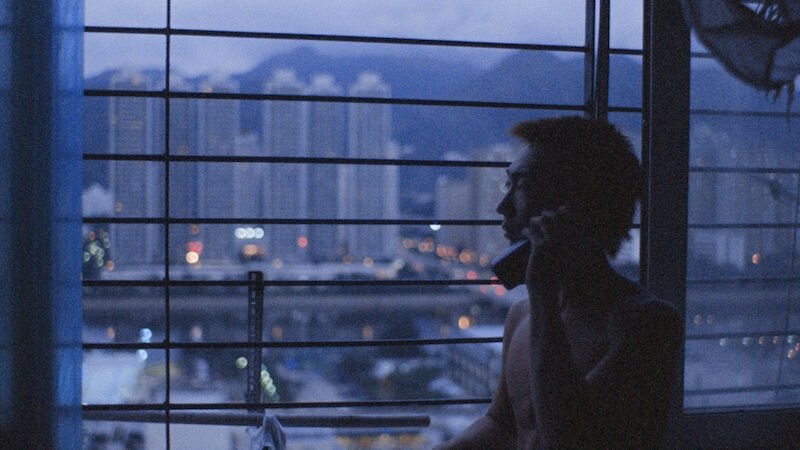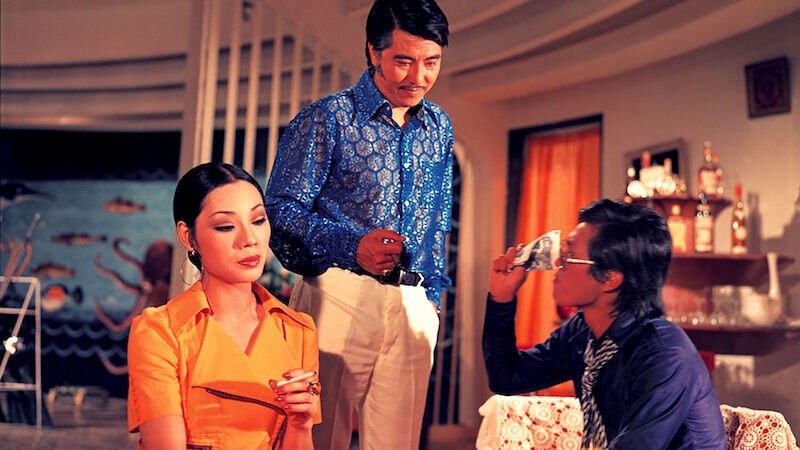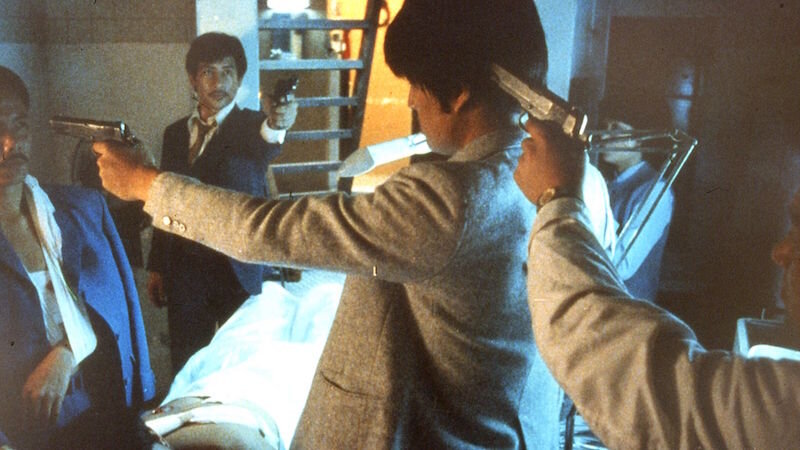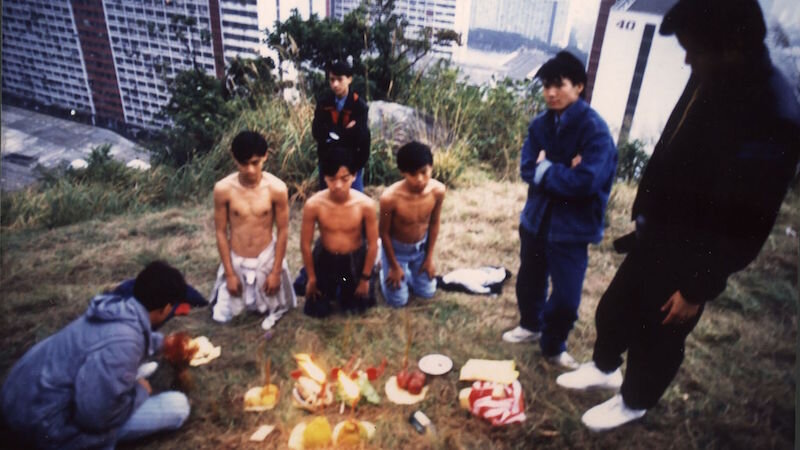IFFR 2020 Roundup
© IFFR
The 49th edition of IFFR (International Film Festival Rotterdam) took place between January 22 and February 2.
A festival and city I’ve been wanting to visit for many years, so I’m glad I finally made it. With more than 500 films, plus talks, art exhibitions and parties, it is quite an expansive film festival in a compact city centre that is easy to get around on foot, despite the very cold temperatures, strong winds and misty rain.
de Doelen, © IFFR
de Doelen is the heart of the festival, hosting screenings, talks, parties and a meeting point for industry and non-industry people attending the festival.
Other screening venues I visited include Pathe, a standalone multiplex that normally screens the latest releases but is taken over entirely by the festival during IFFR.
Cinerama, another multiplex that normally screens the latest releases, but this one is in a residential building (I wish more residential buildings had a cinema).
Kino and LantarenVenster, two standalone venues with multiple screens that also screen a variety of films, including studio and independent films.
Theater Rotterdam Schouwburg, normally a music and performance venue but showed films during the festival, and was also where the Club IFFR parties took place every night.
But the jewel of the festival is Oude Luxor Theater, a performance theatre that is turned into a cinema theatre for IFFR. A building that has been around since 1917 and renovated in 2014.
I liked all the venues, all had comfortable seats and mindful staff. I overheard one IFFR crew member explain to a film director that the festival thinks it is important to keep the end credits rolling till the very end before the cinema lights are turned on. Bonus points for this act alone, and it was good to see how many people sat through the end credits at most of the screenings I attended.
IFFR is more about film and cinema appreciation than celebrities and red carpet glam. It truly felt like it’s a festival for the people of the city, without any hierarchies, fussy red carpets or velvet ropes (I must add there’s also a well attended industry side to it). It’s also one of the most informal and relaxed film festivals I’ve attended, there are no long stressful queues, even though most of the screenings were packed.
I also love how transparent the festival is with its Audience Award, we see all the films in the official selection that gets votes, from the highest to the lowest scores on the website.
The audience at most of the screenings I attended were quite receptive and curious and ready to ask questions during the post screenings Q&As.
”Collectivity” was the underlying theme of this year’s festival. It was also the last year for Bero Beyer as the Festival Director who always greeted the audience with “ladies, gentlemen and sacred beings”. His opening speech emphasised the collective responsibility for creating cinema and how cinema is a form of communication and celebrating who we are, “films asking profound questions, the meaning of it all, searching for any kind of truth”.
He also said that we must cherish the stories that cinema brings to us, “stories that visit the past, review our present and envision the future that somehow shows us what it means to be human”.
He went on to say that cinema and making film shouldn’t be treated as a luxury because a lot of time and passion is devoted to making these stories, and something we collectively should appreciate as creators and as active spectators. He also pointed out the importance of filmmakers who face risks where their societies and identities are at stake, where the notion of freedom of expression is just an ideal, ”being able to say who you are , that you exist may well be the most important thing in the world”.
With such an impassioned opening speech, I was ready to surrender myself to 12 days of the festival.
During the first five days, I also attended IFFR Sessions with 19 other participants who were selected through an open call to take part in discussions on the theme 'Collectivity' amongst a group of curators, artists and writers with daily sessions led by established artists and filmmakers. I will write more about this experience separately.
As always, it is not possible to watch everything one wants to see, but I managed to cover as many sections of the festival as I could.
I did, however, re-watch two recent films, Uncut Gems (Benny Safdie, Josh Safdie, 2019) because how can I miss another chance of seeing this on the big screen after London Film Festival? Knowing it will never get a theatrical release in the UAE, I made sure to schedule it in and very glad I did. The second viewing felt less stressful, but still very enjoyable. Parasite (B&W Version) (Bong Joon Ho, 2019) because it was the premiere of the B&W version and I was curious. I prefer the coloured version.
Here are the rest of my film highlights:
Mosquito (João Nuno Pinto)
The first film I watched was Mosquito (João Nuno Pinto) which was the opening film of the festival. Set in Mozambique in 1917 during World War I, and can be paired with Sam Mendes’ 1917. Besides being set in the same year, both films are also inspired by stories told by the directors’ grandfathers.
Described as a “war film without any war”, it’s a non-linear film about the effects of Portuguese colonialism, crossing unknown territories, illness, hallucinations and random encounters, including one with a tribe of women and their treatment of a white man.
Merry Christmas, Yiwu (Mladen Kovacevic)
Merry Christmas, Yiwu (Mladen Kovacevic) is an observational documentary about Christmas decoration factories in the city of Yiwu in China and the people that run and work in these factories.
The workers make (and are surrounded by) Christmas decorations all year. There are some astonishing scenes of repeated and methodical labour and the large amounts of colourful decorations. A line said by one of the workers that stayed with me, “I’m not tired, I’m angry”.
John Was Trying to Contact Aliens (Matthew Fillip)
The short film John Was Trying to Contact Aliens (Matthew Fillip) is about John Shepherd who has been broadcasting music deep into space for more than 30 years from his grandparents' home in rural Michigan. A film about a man trying to connect with someone. I was surprised by how lovely and moving it was. Below is an excerpt from the film. You can listen to one his broadcasts here. (It was shown before Slow Machine (Paul Felten, Joe DeNardo, 2020) which I didn’t really like, except for Chloë Savigny’s character, and this line, “Brooklyn is a white toddler in a Run DMC t-shirt”.)
My Mexican Pretzel(Nuria Giménez)
IFFR has an abundance of films featuring found footage, it even has an award specifically for filmmakers who made an “outstanding use of archive material”. My Mexican Pretzel (Nuria Giménez) which won this year consists of beautifully filmed home movies edited together of a couple from the 1940-50s, layered with words from a diary. It’s not clear whose home movies and whose diary we are exposed to till the end and you are left asking yourself how much do you trust what you see and read.
Women According to Men (Saeed Nouri)
Filmfarsi (Ehsan Khoshbakht)
One evening, I scheduled a double bill of two films with different insights on Iranian film history, Women According to Men (Saeed Nouri) and Filmfarsi (Ehsan Khoshbakht). The former is a film essay about the portrayal of Iranian women in Iranian cinema between 1932-1979 made up entirely of film clips from the National Film Archive of Iran. It’s a tiny slice of Iranian cinema history and showcases a patriarchal view of women in many films, but there were also films directed by women and leading female stars who weren’t allowed to thrive in their fields.
Film Farsi is a compilation of VHS footage of films and news clips paired with the director’s personal observation of Iran’s social, political and cinema history between 1953 and 1979. The films we see here are trashy, camp and melodramatic. Films that were looked down upon at the time, but I am certain they would be much appreciated today. There’s even a bit of Orson Welles in it too.
It is not clear how well the films are preserved in the National Film Archive of Iran and even though Saeed Nouri was able to get the clips he wanted from the archive to make his film, it is nearly impossible to get permission to screen many of the films featured in Women According to Men in their entirety in public. A similar frustration and disappointment was expressed by Ehsan Khoshbakht during the Q&A after the screening of Filmfarsi.
Harun Farocki: Lexicon (Kevin B Lee)
More archive footage was seen in a short film programme titled Learning Farocki presented by Kevn B. Lee. It included films by Harun Farocki, Kevin B. Lee, Shuruq Harb and Samuel Richter. I’ve been an admirer of Kevin B. Lee’s video essays for a long time, so I was happy to finally see him talk about Harun Farocki and present his work in person, I even attended a separate panel talk with him titled Countering Images. The screenings and the talks left me with lots of thoughts about how to look at images, and how to use images to critique and question what we see.
Un film dramatique (Eric Baudelaire)
Un film dramatique (Eric Baudelaire) is a “film as collective workshop” featuring students from Collège Dora Maar in Saint-Denis, a suburb of Paris. They were asked to film themselves and their lives over four years. Eric Baudelaire did not instruct them on how to make a film, they were simply asked to film whatever they want.
We end up watching the students asking questions about themselves, about society and learning about themselves in the process. Their discussions and observations addresses identity, racism, immigration. They even discuss the meaning of film, one particular scene that starts with a group discussion asking “Is it a film or a documentary?” ends with “It’s magical, not a documentary.”
The Orphanage (Shahrbanoo Sadat)
Another film featuring children, The Orphanage (Shahrbanoo Sadat), a coming of age film based on real events set in Kabul in the late 1980s/early 1990s shortly before the downfall of the Soviet-oriented Watan Party regime. A film about friendship, loss of innocence and Bollywood daydreams as a form of escapism and a coping mechanism. I found this film quite moving.
Beasts Clawing at Straws (Kim Yonghoon)
Beasts Clawing at Straws (Kim Yonghoon), a black comedy crime thriller from South Korea. A non-linear storyline told in five chapters, it took me a while to settle into it, but once I did, it was a lot of fun to watch, especially the second half featuring Jeon Do-yeon’s femme fatale Yeon-hee.
Happy Old Year (Nawapol Thamrongrattanarit)
Happy Old Year (Nawapol Thamrongrattanarit), a bittersweet film from Thailand starring Chutimon Chuengcharoensukying (I last saw her in the excellent exam-heist thriller Bad Genius at London Film Festival in 2017) as Jean who is trying to declutter her family home Marie Kondo-style. Emotional attachments and past memories complicates the process. The film touches upon personal archives, from objects to digital files like photos and film. What remains, what gets discarded, what gets passed on.
I’ve been thinking a lot about how to maintain a personal archive myself and the act of decluttering which I’ve been avoiding for many years. I’m glad I watched this film, nudged me to figure out a plan.
A Dark, Dark Man (Adilkhan Yerzhanov)
The description of A Dark, Dark Man (Adilkhan Yerzhanov) as “jet-black absurdist, anti-Hollywood film about corrupt Kazakh village” instantly made it to the top of my list of films to see at the festival. A crime solving mystery, soon turns into less of a whodunnit and more about deep layers of corruption and amorality.
It’s slow, stark and utterly grim. It also has a terrific electronic music score by Galymzhan Moldanazar. Here’s one of the tracks featured in the film.
I only got to see four films from Perspectives - Ordinary Heroes: Made in Hong Kong which included old and new films from and about Hong Kong. With the recent political and social upheaval, this programme was put together to “reveal through its films – old and new – the political, social and economic tensions tearing it apart today”.
This spotlight proposes to examine Hong Kong through its cinema, past and present. Its thesis is that since Hong Kong is always and intensely political, its most characteristic, eloquent films are, naturally, just as intensely political.
Reading Hong Kong cinema through its history of social and ideological struggle, through the drama of Hong Kong’s social movements, can illuminate the origins and persistent nature of the tensions that are wracking Hong Kong today.
(via https://iffr.com/en/blog/ordinary-heroes-made-in-hong-kong-an-introduction)
I focused on four older films, which together became the highlight of my festival. Made in Hong Kong (Fruit Chan, 1997) is a great 1990s time capsule in terms of fashion and pop culture. A film full of young rage at society. “If we die young, we'll remain forever young.”
The Delinquent (Chang Cheh, 1973), a strange and chaotic, sleazy, gritty kung fu drama, but an utterly entertaining Shaw Brothers production. Check out the opening credits which instantly made me like the film.
Long Arm of the Law (Johnny Mak, 1984), violent and fatalistic. There’s an outrageous scene of a murder at a ice-skating rink. Sadly, the only film made by the director.
Gangs (Lawrence Lau, 1988, 35mm), more frustrated and alienated youth, juvenile delinquency and hopelessness felt from a very young age.
No. 7 Cherry Lane (Yonfan)
Also related to Hong Kong, but from the Deep Focus section of the festival, I watched No. 7 Cherry Lane (Yonfan), a mix of 3D and hand drawn animation, set in 1960s Hong Kong, it’s an ode to the city told through a love triangle. It’s also the horniest film I watched at IFFR!
The film ends with “my dedication to Hong Kong”. It made me miss the city. I hope it prevails and recovers soon.
My last day of the festival started with a strangely accidental double bill, Nasir (Arun Karthick) and Jeanne Dielman, 23 Quai du Commerce, 1080 Bruxelles (Chantal Akerman, 1975). Although both films differ in lengths, Nasir is 78mins compared to Jeanne Dielman’s 202 mins, they both focus on daily and banal routines, and share an extended silent ending.
Nasir (Arun Karthick)
Nasir is a quiet and gentle man, a Muslim living in the southern Indian state of Tamil Nadu surrounded by Hindu nationalism.
There are touching and poetic moments of beauty on display in Nasir’s life, underlined with anti-Muslim sentiments.
The film had its premiere at the festival and I hope it travels to more festivals and gets seen by more people.
Jeanne Dielman, 23 Quai du Commerce, 1080 Bruxelles (Chantal Akerman, 1975)
I first watched Jeanne Dielman, 23 Quai du Commerce, 1080 Bruxelles at home a few years ago, but I didn’t want to miss the opportunity to see it on the big screen.
Needless to say, it was an incredibly rewarding experience.
The complete list of films I watched per section at IFFR:
Bright Future - Bright Future Main Programme
Air Conditioner (Eradique, 2020)
Merry Christmas, Yiwu (Mladen Kovacevic, 2020)
Slow Machine (Paul Felten, Joe DeNardo, 2020)
My Mexican Pretzel (Nuria Giménez, 2019)
Make Up (Claire Oakley, 2019)
Bright Future - Tiger Competition
Beasts Clawing at Straws (Kim Yonghoon, 2020)
Nasir (Arun Karthick, 2020)
Deep Focus - Beth B: War Is Never Over
Two Small Bodies (Beth B, 1993, 35mm)
Jeanne Dielman, 23 Quai du Commerce, 1080 Bruxelles (Chantal Akerman, 1975)
Deep Focus - Marion Hänsel, à la vie
Le Lit (Marion Hänsel, 1982, 35mm)
Dust (Marion Hänsel, 1985)
Deep Focus - Regained
Nimic (Yorgos Lanthimos, 2019)
Repo Man (Alex Cox, 1984, 35mm)
Women According to Men (Saeed Nouri, 2020)
Filmfarsi (Ehsan Khoshbakht, 2019)
Learning Farocki (short film programme):
Two Paths (Harun Farocki, 1966)
Everybody a Berliner Kindl (Harun Farocki, 1966)
The White Elephant (Shuruq Harb, 2018)
Image Missing (Samuel Richter, 2019)
Harun Farocki: Lexicon (Kevin B Lee, 2019)
Harun Farocki: Presented (Kevin B Lee, 2019)
Harun Farocki: The Counter-Image (Kevin B Lee, 2019)
Deep Focus - Signatures
Un film dramatique (Eric Baudelaire, 2019)
No. 7 Cherry Lane (Yonfan, 2019)
Perspectives - Ordinary Heroes: Made in Hong Kong
Made in Hong Kong (Fruit Chan, 1997)
The Delinquent (Chang Cheh, 1973)
Long Arm of the Law (Johnny Mak, 1984)
Gangs (Lawrence Lau, 1988, 35mm)
Perspectives - Synergetic
The End Will Be Spectacular (Ersin Celik, 2019)
Perspectives - The Tyger Burns
With Love – Volume One 1987-1996 (Michael Pilz, 2020)
Voices - Big Screen Competition
Mosquito (João Nuno Pinto, 2020)
Eden (Ágnes Kocsis, 2020)
Synapses (Chang Tso-chi, 2019)
Voices - Limelight
Uncut Gems (Benny Safdie, Josh Safdie, 2019)
The Wild Goose Lake (Diao Yi'nan, 2019)
Voices - Voices Main Programme
The Orphanage (Shahrbanoo Sadat, 2019)
Happy Old Year (Nawapol Thamrongrattanarit, 2019)
Parasite (B&W Version) (Bong Joon Ho, 2019)
A Dark, Dark Man (Adilkhan Yerzhanov, 2019)
Voices - Voices Short
John Was Trying to Contact Aliens (Matthew Fillip, 2020)



























